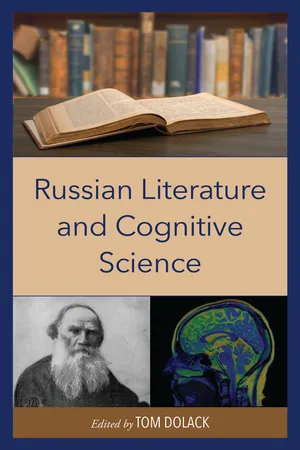
- 309 pages
- English
- PDF
- Available on iOS & Android
eBook - PDF
Russian Literature and Cognitive Science
About this book
Russian Literature and Cognitive Science applies the newest insights from cognitive psychology to the study of Russian literature. Chapters focus on writers and cultural figures from the Golden to the Internet Age including: Pushkin, Dostoevsky, Tolstoy, Sologub, Bely, Akhmatova, Nabokov, Baranskaya, and contemporary online discourse. The authors draw on a wide array of cognitively-informed fields within psychology and related disciplines and approaches such as social psychology, visual processing, conceptual blending, cognitive narratology, the study of autism, cognitive approaches to creativity, the medical humanities, reader reception theory, cognitive anthropology, psychopathology, psychoanalysis, Theory of Mind, visual processing, embodied cognition, and predictive processing. This volume demonstrates how useful a tool cognitive science is for the analysis of literary texts.
Frequently asked questions
Yes, you can cancel anytime from the Subscription tab in your account settings on the Perlego website. Your subscription will stay active until the end of your current billing period. Learn how to cancel your subscription.
No, books cannot be downloaded as external files, such as PDFs, for use outside of Perlego. However, you can download books within the Perlego app for offline reading on mobile or tablet. Learn more here.
Perlego offers two plans: Essential and Complete
- Essential is ideal for learners and professionals who enjoy exploring a wide range of subjects. Access the Essential Library with 800,000+ trusted titles and best-sellers across business, personal growth, and the humanities. Includes unlimited reading time and Standard Read Aloud voice.
- Complete: Perfect for advanced learners and researchers needing full, unrestricted access. Unlock 1.4M+ books across hundreds of subjects, including academic and specialized titles. The Complete Plan also includes advanced features like Premium Read Aloud and Research Assistant.
We are an online textbook subscription service, where you can get access to an entire online library for less than the price of a single book per month. With over 1 million books across 1000+ topics, we’ve got you covered! Learn more here.
Look out for the read-aloud symbol on your next book to see if you can listen to it. The read-aloud tool reads text aloud for you, highlighting the text as it is being read. You can pause it, speed it up and slow it down. Learn more here.
Yes! You can use the Perlego app on both iOS or Android devices to read anytime, anywhere — even offline. Perfect for commutes or when you’re on the go.
Please note we cannot support devices running on iOS 13 and Android 7 or earlier. Learn more about using the app.
Please note we cannot support devices running on iOS 13 and Android 7 or earlier. Learn more about using the app.
Yes, you can access Russian Literature and Cognitive Science by Tom Dolack in PDF and/or ePUB format, as well as other popular books in Literature & Russian Literary Criticism. We have over one million books available in our catalogue for you to explore.
Information
Table of contents
- Cover
- Half Title
- Series Page
- Title Page
- Copyright Page
- Contents
- Preface
- Introduction
- Chapter 1: Pushkin’s “The Stationmaster”: Morality Meets Sexual Selection
- Chapter 2: Flow and Selfhood in Leo Tolstoy’s Anna Karenina: A Case Study of the Mowing Scene
- Chapter 3: Facial Imagery, Reader Visualization, and the Visual Ethics of War and Peace
- Chapter 4: A Multi-Level Cognitive Approach to Pushkin
- Chapter 5: Staying Imperturbable in the Face of Fate: Alexander Pushkin’s Gothic Stories Conveying the Code of Honor in the Face of the Supernatural
- Chapter 6: (Un)Reading and the “Gappiness” of Context: Toward a New Cognitive Reception Theory
- Chapter 7: Re-visioning Despair: The Medical Gaze in Sologub’s The Petty Demon
- Chapter 8: Autism in Nabokov’s The Defense
- Chapter 9: Provocation and Pre-Diction: Terrorist Realism as a Narrative Mode in the Russian Empire 1862–1914 (Particularly in Andrei Bely’s Petersburg, 1913)
- Chapter 10: Mass Shooters as Underground Men of the Twenty-first Century
- Chapter 11: Russian Cognitive Approaches for Studying Genres of Contemporary Electronic Communication: Interpreting “Sincere Conversations” in New Media
- Chapter 12: Dream (Re)Interpretation: Metaphors and Story Schemas in Meaning Creation
- Chapter 13: Intersections between Language, Social Norms, and Individual Cognition in Natalya Baranskaya’s A Week Like Any Other
- Chapter 14: Cognitive Aspects of Deixis and Semantic Poetics of Anna Akhmatova and Joseph Brodsky
- Index
- About the Contributors